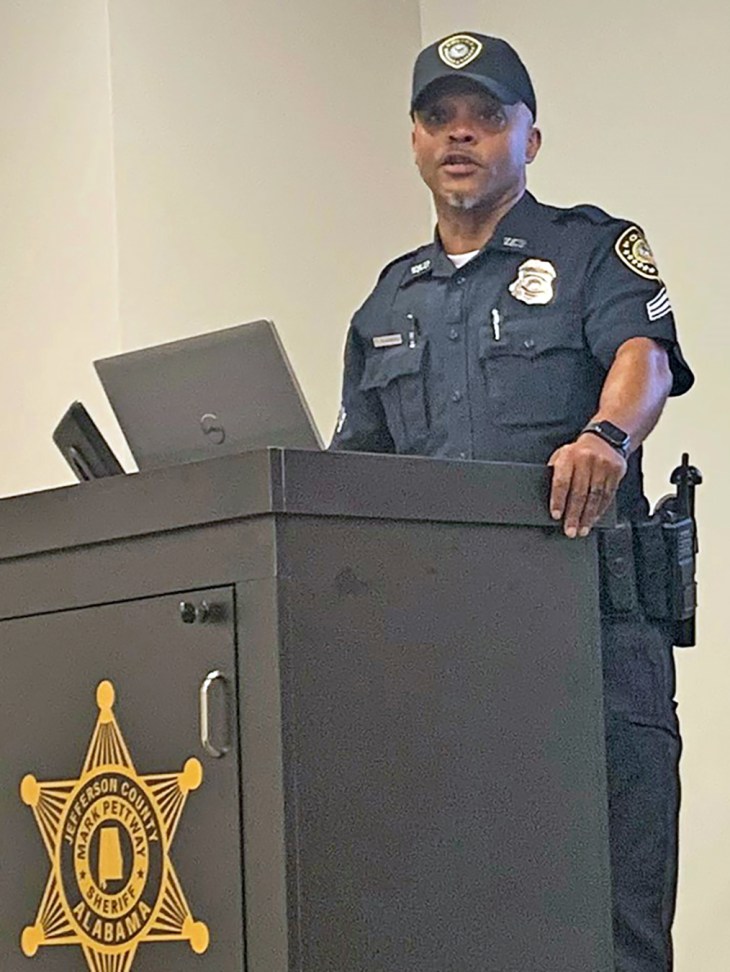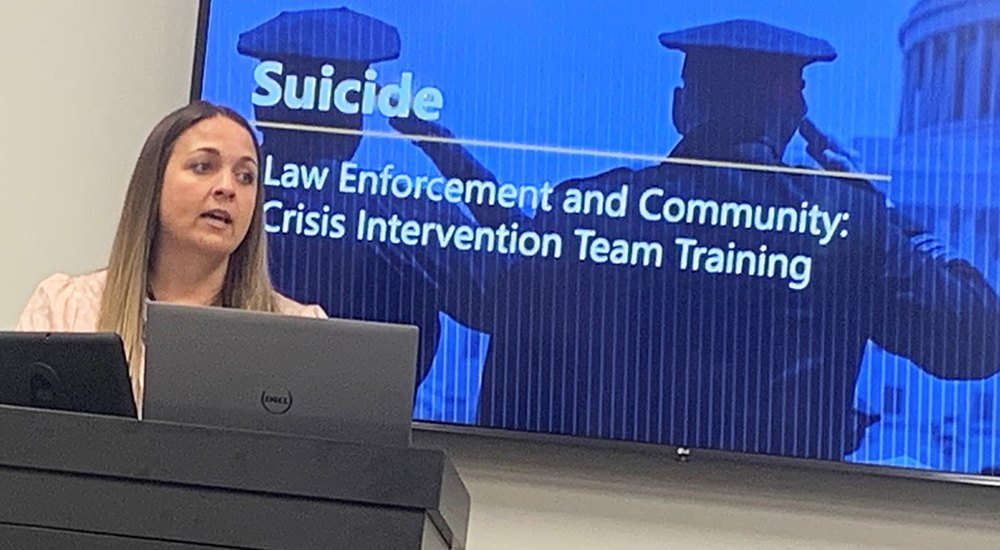Law enforcement officers serve as first responders to many crises. Birmingham VA staff recently presented a series of training blocks to the Jefferson County Sheriff’s Office.
The training sessions focused on suicide prevention, crisis intervention and domestic violence, and were part of the Sheriff’s Office’s Crisis Intervention Teams (CIT) 40-hour course at their Fultondale, Alabama, training center.
The Jefferson County CIT program is a community-based approach to improve the outcomes of crisis encounters. In over 2,700 communities nationwide, CIT programs create connections between law enforcement, mental health providers, hospital emergency services and individuals with mental illnesses and their families.
“The objective of this training is to provide guidelines to police officers so they can better serve individuals in our community who may be experiencing a mental health crisis,” said Tommie Black, Jefferson County Sheriff Training Center director. “The Jefferson County Sheriff’s Office intends to preserve the dignity of individuals who may be emotionally distressed or experiencing mental or emotional difficulties while providing them with first responder services.
“The goal is to de-escalate the situation, prevent violence and injury, obtain appropriate services, divert the individual from the criminal justice system and quickly get our officers back to protecting our communities.”

The National Alliance on Mental Illness estimates that 1 in 5 U.S. adults experience mental illness annually. Over 794,000 adults in Alabama have a mental health condition. One in four people with a mental illness have been arrested by police at some point in their lifetime leading to over two million jail bookings of people with mental illness each year.
Mental illness can also include thoughts of suicide
Research has found that 46% of people who die by suicide have a known mental health condition. The average number of suicides per day among U.S. adults rose 55% from 81 in 2001 to 125 in 2019. Across the same 18-year period, the average number of Veteran suicides per day increased by 4.5%, from 16 in 2001 to 17 in 2019.
“Women attempt suicide three times more often than men but men die by suicide at a higher rate, as they tend to use more lethal means, such as firearms,” said Kelli Arthur, VA social worker.
The person in crisis may also provoke law enforcement, and this involvement by the CIT reinforces the training already taught to law enforcement. According to Arthur, the goal is to explain the unique nature of mental health, whether the person is a non-Veteran or Veteran when law enforcement responds to an incident.
“Do not be afraid to ask questions like, do you have a weapon, are you thinking of harming or killing yourself or do you plan to die by suicide?” Arthur added.
Intimate partner violence and mental health
VA estimates 1 in 3 women and 1 in 4 men in the U.S. have experienced violence by an intimate partner in their lifetime. Research also shows Veterans are twice as likely to experience intimate partner violence.
“There are many factors that can contribute to acts of violence,” said Amanda Phillips, Intimate Partner Violence Assistance Program coordinator. “Some include Post Traumatic Stress Disorder (PTSD), job loss, substance abuse or homelessness.”
Victims, perpetrators and even children affected have a higher risk of developing mental health conditions. “Abusive relationships are not easy to get out of, and it can create an even more dangerous situation for the person trying to leave,” Phillips said.
Phillips encouraged law enforcement officers to ask direct questions when encountering a suspected victim of intimate partner violence: Have you been hit, threatened, insulted or sexually abused?
“Signs of violence or abuse are not always visible. There are instances when a forensic examiner has to be contacted,” she added. VA provides service and recovery to victims of violence, but also perpetrators of violence.
Providing solutions
If law enforcement officers encounter a Veteran experiencing a mental health crisis or are the victim of violence, Birmingham VA has trained operators on hand 24 hours a day, seven days a week to assist them. A dispatch desk number restricted to law enforcement use only has been established to help and guide them in transporting the Veteran to a facility for immediate treatment.
“If a law enforcement officer identifies an individual as a Veteran suspected of experiencing a mental health crisis, our goal is to direct the officer to our facility or a local community partner, initiate a hand-off and obtain a brief report from the deputy,” said Sgt. Tim Yearwood, VA Police officer. “We intend to have the officer on-site in 15 minutes or less.”
Birmingham VA has many community partners that provide services and resources to Veterans and their families. Some include OneRoof, providing homeless continuum of care services, Recovery Resource Center addiction treatment and JBS Mental Health Authority Crisis Care Center.
“We are fully committed to connecting our Veterans with the right services in the least amount of time,” said Yearwood. “We feel intervention is the answer, not incarceration.”
Veterans experiencing a mental health or emotional crisis, feeling hopeless, thinking about hurting or killing themselves or others or engaging in self-destructive behavior such as drug abuse can call the Veterans Crisis Line by dialing 988, then pressing 1.
Topics in this story
More Stories
Caregiving can be a deeply rewarding journey, but it also can be overwhelming and isolating. That’s why support and connection can make all the difference.
The slopes of the Winter Sports Clinic help Veterans with disabilities remember that pushing boundaries—and not their limitations—is what defines them.
One unbreakable bond shows that "even little things can change people’s lives.”





